Arizona Law Requiring Proof Of Citizenship To Register To Vote Struck Down By SCOTUS
Today's decision by the Supreme Court was, on the surface, a victory for Federal Supremacy, but the issue itself is far from resolved.
Today, the Supreme Court struck down an Arizona law passed in 2004 via voter referendum that requires people registering to vote to provide proof of citizenship at the time of registration. In it’s ruling, the Court essentially held that the law, which is largely identical to similar laws in Alabama, Kansas, and Georgia, is unconstitutional because it is pre-empted by a Federal law that has been on the books since the early 1990s and is known popularly as “Motor Voter” law:
WASHINGTON — Arizona may not require documentary proof of citizenship from people seeking to vote in federal elections there, the Supreme Court ruled in a 7-to-2 decision on Monday.
Justice Antonin Scalia, writing for the majority in Arizona v. Inter Tribal Council of Arizona, No. 12-71, said a federal law requiring states to “accept and use” a federal form displaced an Arizona law requiring various kinds of proof of citizenship.
The federal law, the National Voter Registration Act of 1993, allows voters to register using a federal form that asks, “Are you a citizen of the United States?” Prospective voters must check a box for yes or no, and they must sign the form, swearing under the penalty of perjury that they are citizens.
The state law, by contrast, required prospective voters to prove that they were citizens by providing copies of or information concerning various documents, including birth certificates, passports, naturalization papers or driver’s licenses, that are available only to people who are in the state lawfully.
The state law was a result of a 2004 voter initiative, Proposition 200, that said it was meant to combat voter fraud. The law has given rise to tangled proceedings ever since. Under the Voting Rights Act of 1965, Arizona was required to obtain federal approval before it changed its voting procedures. The Justice Department granted approval in 2005.
According to the plaintiffs in the case, tens of thousands of Arizonans have been denied the ability to vote because they failed to present the required evidence.
Much of Justice Scalia’s majority opinion concerned the meaning of the phrase “accept and use.” Arizona officials argued that they do accept and use the form, but also require additional information. An airline may accept and use e-tickets, they said, but also require identification.
When the case was argued in March, Thomas C. Horne, Arizona’s attorney general, said the federal approach was insufficient to protect the integrity of federal elections in his state. “It’s essentially an honor system,” he said of the statement required by the federal form. “It does not do the job.”
In the decision on Monday, Justice Scalia said the phrase “accept and use,” when understood in context, meant that the federal form had to be accepted as sufficient. Chief Justice John G. Roberts Jr. and Justices Ruth Bader Ginsburg, Stephen G. Breyer, Sonia Sotomayor and Elena Kagan joined all of the majority opinion, and Justice Anthony M. Kennedy joined most of it.
In a concurrence, Justice Kennedy said that the majority went too far in suggesting that federal laws concerning elections were not subject to a presumption often said to be applicable to federal laws: that they should not be presumed to displace state laws. Justice Scalia said that presumption was not applicable to federal laws concerning voting.
Justice Kennedy objected to what he called the establishment of “a hierarchy of federal powers” in this area. The discussion was not needed, he said, because the federal law at issue was “unambiguous in its pre-emption of Arizona’s statute.”
In a long dissent, Justice Clarence Thomas said the Constitution gave states the power “to determine the qualifications of voters in federal elections, which necessarily includes the related power to determine whether those qualifications are satisfied.”
“Congressional legislation of voter qualifications was not part of the framers’ design,” Justice Thomas wrote.
In a second dissent, Justice Samuel A. Alito Jr. focused on the language of the federal law, which he said was ambiguous. The majority’s interpretation of it, Justice Alito wrote, “produces truly strange results.” He said he would read the law to mean that states “accept and use” the federal form so long as it is “a meaningful part of the registration process.”
Although many in the media are treating it as such, this isn’t a Voter ID case per se because it doesn’t deal with the issue of laws that require voters who are already registered to show identification when they show up at the polls to vote. On that issue, it’s worth noting that the Supreme Court has already upheld voter identification laws in a case that was decided five years ago that dealt with a Voter ID law in Indiana. Here, the Court is dealing with the requirements that must be met by someone when they go to register to vote.
On the surface, this opinions reads like a fairly clear victory for the Plaintiffs in the case, and a clear recognition of the principle of the supremacy of Federal Law set forth via the Constitution’s Supremacy Clause. Indeed, notwithstanding the dissents of Justices Alito and Thomas, the Courts conclusion seems axiomatic. The Federal Law in question sets forth the requirements that must be met for a person to be eligible to register to vote in Federal elections, the form that was created in the wake of that law simply requires an applicant to swear under penalty of perjury that they are a citizen of the United States, and the law itself requires states to “accept and use” the Federal form. While the dissenters attempt to parse this language in a way that makes it possible for the states to add to the requirements set forth in the Federal Law, it seems fairly obvious that these arguments must fail. If Federal Law is supreme, then that means it is the final word on the subject until that law is amended, repealed, or struck down by a Court. The idea that states can somehow add to that law on an ad hoc basis would seem to fly in the face of Federal Supremacy as established by the Constitution’s Supremacy Clause. This is largely why this cases was decided by a 7-2 majority that included both the Courts liberal wing and some of its most conservative members.
>However, the analysis doesn’t quite end there. As Lyle Denniston pointed out in his analysis of the case, there is much in the opinion that suggests that Arizona and other states could achieve the ends of the law that was struck down by other means:
If a reader of the Scalia opinion stopped at the top of page 13, the impression would be very clear that Congress had won hands down in the field of regulating federal elections. But from that point on, there is abundant encouragement for what is essentially a states’ rights argument: that is, that the states have very wide authority to define who gets to vote, in both state and federal elections.
On the particular point at issue in this case — Arizona’s requirement of proof of citizenship before one may register to vote or actually vote — the Scalia opinion said that a state was free to ask the federal government for permission to add that requirement. And, Scalia said, if that doesn’t work — either because the federal agency that would deal with such a request is either not functioning or says no — then a state would be free to go to court and make an argument that it has a constitutional right to insist on proof of citizenship as an absolute qualification for voting, in all elections.
The opinion seemed to leave little doubt that, if Arizona or another state went to court to try to establish such a constitutional power, it might well get a very sympathetic hearing, because that part of the Scalia opinion laid a very heavy stress on the power of states under the Constitution to decide who gets to vote. Indeed, that part of the opinion said that the Constitution simply does not give Congress the power to decide who can qualify, but only how federal elections are run procedurally.
It will be up to lower courts — and election-law specialists — to sort out just how to reconcile the two parts of the Court’s majority opinion. And it appears there may well be quite a few opportunities to do so, because of the rising number of efforts — particularly in states in which Republicans have control of state governments — to impose new voter ID and other restrictions on the right to vote.
If the Arizona ruling turns out, in the future, to widen the power of states to limit the right to vote, the decision might turn out to have been far more decisive than its internal contradictions suggested on first reading on Monday.
The other factor worth noting here is that the Constitution only gives Congress authority to regulate Federal elections. Outside of laws such as the Voting Rights Act of 1965, Congress has no real authority over state and local elections. Theoretically, Arizona could possibly set up a completely separate registration system for such elections and the “Motor Voter” law would have no real authority over it. Realistically, this would likely be far too administratively cumbersome to be practical. Instead, states like Arizona are likely to take the steps that Denniston mentioned such as petitioning the Federal Government and Congress specifically to add to the Federal Form some requirement to provide documentation to prove citizenship such as providing a copy of a birth or naturalization certificate. Assuming that the relevant authorities declined such a request, which seems likely, the states would then be free to go to court to seek permission to impose their own additional requirements given the rejection by Federal authorities. Based on the tone of the later part of the Majority Opinion, it would seem that such an application would be treated sympathetically if it came before the Court as it exists today.
Here’s the opinion:
Arizona v. Inter-Tribal Council of Arizona et al by dmataconis
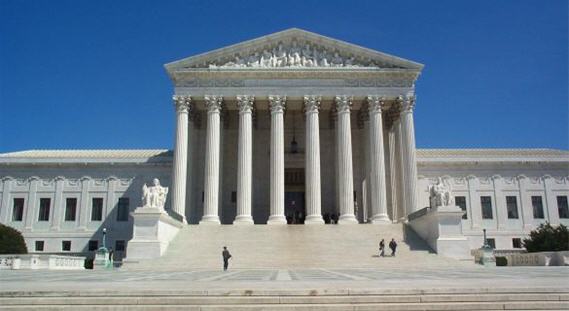

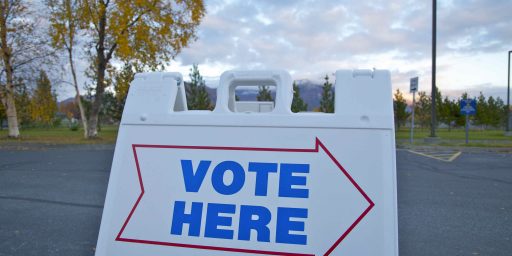
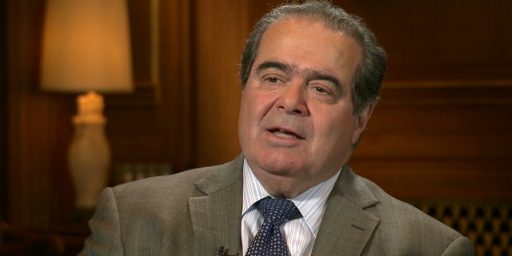

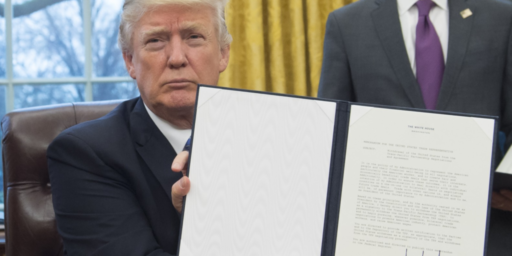
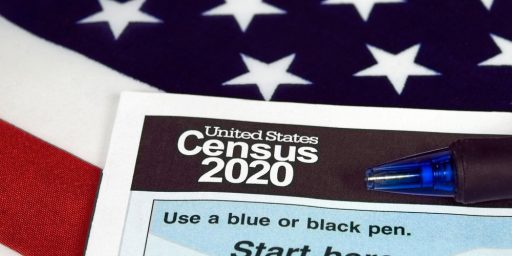
So the Supreme Court affirms the Constitution’s key role as protector of minorities from the tyranny of the majority. I am glad to hear it, but I cannot imagine why anyone would have thought it would come out differently, assuming an honest court.
The opinion doesn’t get into that issue at all. This is a pure Supremacy Clause case, not a civil rights case. If that were the only issue that the Plaintiffs had raised, its unlikely that the result would’ve been the same.
Agree, but,
So I guess my point was that by raising the bar of oversight and scrutiny for issues such as this, the supremacy clause is in alignment with other protections afforded by the constitution. An alternative outcome, such as that suggested by Thomas’ dissent, would have damaged that protector role by strengthening the states-rights crowd. Interesting dissent, by the way, coming from a likely descendent of people who probably suffered under those same states-rights advocates 100 years ago.
I understand the arguments for a voting process that does not discriminate, humiliate, or intimidate people. But a fraudulent system also does those things. I have to show id to get a library book, enter a theme park, and buy drinks. Kids have to show birth certificates to get on a soccer team. You have to show proof of residence when you register to vote. Certain activities require paper. We certainly do not want someone winning an election because a bunch of cemetary residents voted for them.
@Tony W:
Indeed it was an interesting dissent, especially so since Thomas became the first SC justice to cite Bush v Gore ever:
The NVRA’s “accept and use” requirement applies to all federal elections, even presidential elections… This Court has recognized, however, that “the state legislature’s power to select the manner for appointing [presidential] electors is plenary; it may, if it chooses, select the electors itself.” Bush v. Gore, 531 U. S. 98, 104 (2000)
via TPM
Well apparently, according to the esteemed Patricia Millett, a lawyer for groups opposed to the law, “Statements under oath in a criminal case are proof beyond a reasonable doubt” in criminal cases that result in execution. “It’s a very serious oath,” she said.
So me signing a government form and affirming under punishment of perjury is sufficient. Therefore I should be able to simply sign the Firearm Purchase form 4473 stating I’m not a felon, drug user, mental patient, etc., and walk out with my firearm. There is no need for me to prove who I am or undergo both a federal and VA State background check as these are unnecessary legal hoops. Not to mention certain states that require waiting periods in addition to the afore mentioned background checks. If the Supremacy Clause reigns, these states should be slapped down for over burdening a citizens right to own a firearm. I’ll hold my breath while Holder’s DOJ gets on that.
To prarphrase the court’s opinion, “We conclude that the fairest reading of the statute is that a state-imposed requirement of evidence of [identification, a ste background check, and waiting period is] not required by the Federal Form is “inconsistentwith” the [Brady Act’s] mandate that States “accept and use” the Federal Form [4473].”
@Tyrell:
I would point out that voting is the only thing on that list you, as a US citizen, have a specific right to do…
That’s a slap in the face to the wicked witch of Arizona, Jan Brewer and that racist Sheriff Joe Arpaio. That cooled their jets. Thank god the SCOTUS struck it down!
@legion: The Constitution contains many phrases, clauses, and amendments detailing ways people cannot be denied the right to vote. You cannot deny the right to vote because of race or gender. Citizens of Washington DC can vote for President; 18-year-olds can vote; you can vote even if you fail to pay a poll tax. The Constitution also requires that anyone who can vote for the “most numerous branch” of their state legislature can vote for House members and Senate members.
Note that in all of this, though, the Constitution never explicitly ensures the right to vote, as it does the right to speech, for example. It does require that Representatives be chosen and Senators be elected by “the People,” and who comprises “the People” has been expanded by the aforementioned amendments several times. Aside from these requirements, though, the qualifications for voters are left to the states. And as long as the qualifications do not conflict with anything in the Constitution, that right can be withheld.
The problem is voter fraud via illegal immigration. People that are not US citizens are registering to vote with stolen identifications, SSN’s, etc. Why should foreign nationals have the ability to vote in US elections? BTW Arizona experiences crime and saturation of public services unlike the rest of the country.
The Salinas case is a much bigger deal to me, I’d like to hear your analysis on that one, Doug. It feels like the 5th Amendment was significantly weakened.
Hello friends, how is everything, and what you desire to say concerning
this piece of writing, in my view its genuinely amazing in support of me.
@Don:
Those claims probably need a link to be taken seriously.
@Don:
I’ve heard that before, but I’ve never, ever seen any proof of it. No news stories, no arrests at the polls, no charges filed… Nothing. I’ve also never heard any good reason for why an illegal alien would bother to take unpaid time off from his already low-paid crap job and go vote in an election that doesn’t actually concern him.
This suggestion is just so much balloon juice.
@Ben:
Not seeing it. The 5th Amendment right against self-incrimination requires active assertion, except in the case of two limited exceptions.
1) A criminal defendant doesn’t have to assert the privilege at his own criminal trial. He can simply refuse to take the stand in his own defense, which is a constructive assertion of the right.
2) Failure to invoke is excused in instances of police coercion (note: actual coercion).
Salinas wasn’t at trial; he was being questioned, so the first exception is inapplicable to his situation.
With regard to the second, Salinas was not under arrest. He voluntarily agreed to accompany police officers to their station, was free at any time to request that his attorney intercede to represent his interests, and indeed was free to leave the police station at any time had he chosen to do so.
Salinas voluntarily chose to go to the police station when he did not have to do so. He voluntarily chose not to request the presence of an attorney when he could have done so. Despite being under no burden to answer any questions, he voluntarily chose to answer some questions, but not others. Finally, he voluntarily chose to remain in the police station when he was free to leave at his discretion.
Salinas was trying to effectively create a third exception and overturn the doctrine of positive assertion with respect to the 5th Amendment by construing any silence / refusal to answer as a constructive assertion of 5th Amendment privilege. That’s reaching, IMO.
This is really interesting, You’re a very skilled blogger. I have joined your rss feed and look forward to seeking more of your wonderful post. Also, I’ve shared your website
in my social networks!
@rachel:
Or why an illegal alien, who presumably wants to stay under the radar and avoid both attention and arrest, would voluntarily commit a federal felony for no actual benefit to himself.
@Rafer Janders:
Multiple choice answers:
A) Because they’re under orders to do so as agents in the first wave of the Latino / commie conspiracy to take back the southwest.
B) Because they’re paid to vote by the liberal media complex.
C) Because they resent our freedom.
D) Wait, no, they don’t actually do this, do they?
I really miss the high looniness of the election year.
@John H:
GOLDEN!!
@Don:
Prove it or GTFO.
Any person who is a non-citizen who votes illegally (there are a few circumstances where they can be allowed to vote, say, in municipal elections) is not only committing a crime but is making themselves deportable (if they have a green card) and will be blocked from adjusting their status to a green card should that option otherwise become available in the future (say, through an amnesty program).
Thus, it should not be surprising that non-citizens voting has pretty much never been shown to actually happen, ever.
@Don: “The problem is voter fraud via illegal immigration. ”
You’re lying; IIRC the ‘anti-voter fraud’ people have come up with 50 cases of people voting illegally, across the USA, over many elections. That’s not a problem.
Harvard: I know the courts have spoken to the right having to be positively invoked.But I have a hard time seeing that in the language of the 5th.